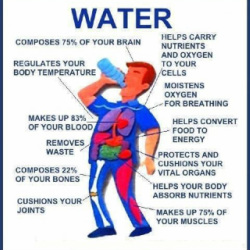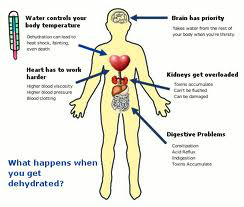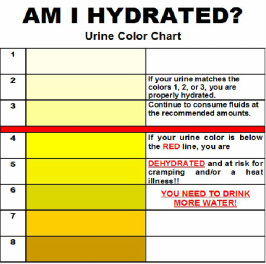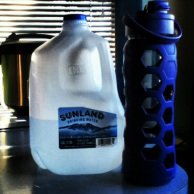Are you Chronically Dehydrated?

Most of us are familiar with dehydration; a physiological state that occurs when the body is too low in water to continue normal metabolic functions. Dry mouth, dry skin, low grade fever, fatigue, headache, nausea, muscle
cramps, low blood pressure, extreme thirst, constipation, and brain fog are some of the classic signs of dehydration, but also the last. Dehydration begins affecting the body before any symptoms arise, leaving most people in a chronically dehydrated state.
Water is the most abundant compound in the human body, accounting for 60-75% of total body mass. Most, it not all cellular reactions in the body require water. It is responsible for nutrient transportation and absorption, energy production, temperature and blood pressure regulation, cell structure and tissue composition, enzyme functioning, metabolism, respiration, digestion, electrolyte balance, and detoxification (toxin and fat removal).
Dietary, lifestyle, and environmental factors all influence hydration status. Factors that promote dehydration include high protein/high fat diets, low carbohydrate/calorie diets, caffeine (sodas, coffee, energy drinks, tea), diet pills, laxatives, salt, pollution, alcohol, tobacco, recreational drugs, diuretics, medication (OTC and prescription), exercise, indoor living, illness, and hot/dry climates.
cramps, low blood pressure, extreme thirst, constipation, and brain fog are some of the classic signs of dehydration, but also the last. Dehydration begins affecting the body before any symptoms arise, leaving most people in a chronically dehydrated state.
Water is the most abundant compound in the human body, accounting for 60-75% of total body mass. Most, it not all cellular reactions in the body require water. It is responsible for nutrient transportation and absorption, energy production, temperature and blood pressure regulation, cell structure and tissue composition, enzyme functioning, metabolism, respiration, digestion, electrolyte balance, and detoxification (toxin and fat removal).
Dietary, lifestyle, and environmental factors all influence hydration status. Factors that promote dehydration include high protein/high fat diets, low carbohydrate/calorie diets, caffeine (sodas, coffee, energy drinks, tea), diet pills, laxatives, salt, pollution, alcohol, tobacco, recreational drugs, diuretics, medication (OTC and prescription), exercise, indoor living, illness, and hot/dry climates.

What happens when we become dehydrated?
The body goes into water rationing mode, prioritizing it's internal water supply so that the vital organs are able to receive enough water to continue basic functioning. The brain, lungs, liver, kidneys, and glands take first priority, followed by the muscles, bones, and skin. The body activates histamine in order to run this water rationing system, preventing unnecessary water loss, but triggering inflammation. Chronic histamine activation (due to chronic dehydration) can influence the following inflammatory disorders: allergies, asthma, dyspepsia (acid reflux), colitis, joint pain, migraine headaches, fibromyalgia, rheumatoid arthritis, adrenal fatigue, candida, acne, cancer, fat/fluid retention, and Alzheimer’s disease.
When water is in short supply, normal biological processes such as respiration, digestion, absorption, and elimination all become compromised. Normal respiration requires a large amount of water, so when water becomes scarce, the body pulls water from the lungs, constricting normal air flow. Water also becomes unavailable for digestion and absorption, which both rely heavily on large amounts of water. This can result in heart burn, indigestion, stomach ulcers, gastroesophageal reflux disorder (GERD), and malnutrition. Elimination is severely affected by dehydration, causing water to be pulled from the colon and recirculated/redistributed to priority organs. Not only does this result in constipation, but the water absorbed back into the system is unfiltered, placing added strain on both the liver and kidneys.
Because dehydration affects every system in the body, chronic dehydration can lead to major physiological and biochemical problems if left untreated. Long term health consequences of chronic dehydration can include: depression/anxiety, sleep disorders, chronic fatigue syndrome, digestive problems (IBS, colitis), weight (fat/fluid) gain, cancer, high cholesterol, blood pressure imbalance, heart disease, decreased athletic performance, respiratory disorders, malnutrition, skin disorders (eczema, acne), kidney and liver disorders, hormonal disorders (adrenal fatigue, thyroid imbalance), urinary tract infections, autoimmune disorders, and premature aging.
Water and Weight Loss
Water is quite possibly the most important player when it comes to weight loss. If you are hydrated, the likelihood of fat storage is minimal, and if you've dehydrated, fat storage becomes favorable. This phenomenon happens for a few reasons. We when become dehydrated, the body temperature drops, increasing the need for fat storage as the body attempts to raise its internal temperature back to normal. This decrease in body water also decreases the efficiency of the kidneys, resulting in some kidney functions shunted to the liver. The increased burden on the liver by the kidneys now compromises one of the liver's primary functions: metabolizing stored fat into usable energy. Now that the liver is no longer able to efficiently metabolize stored fat, less stored fat is able to be burned. Dehydration also spikes cortisol levels due to the tremendous amount of stress placed on the body systems, thus promoting fat storage and decreasing the metabolism to converse water and energy. In the end, chronic dehydration results in weight gain, fatigue, stress, and an inefficient metabolism. The only way to reverse this, is to become hydrated! Hydration not only amps up metabolism, but it also aids in reducing fatty deposits. All symptoms associated with chronic dehydration can be reversed by simply staying consistenly hydrated!
The body goes into water rationing mode, prioritizing it's internal water supply so that the vital organs are able to receive enough water to continue basic functioning. The brain, lungs, liver, kidneys, and glands take first priority, followed by the muscles, bones, and skin. The body activates histamine in order to run this water rationing system, preventing unnecessary water loss, but triggering inflammation. Chronic histamine activation (due to chronic dehydration) can influence the following inflammatory disorders: allergies, asthma, dyspepsia (acid reflux), colitis, joint pain, migraine headaches, fibromyalgia, rheumatoid arthritis, adrenal fatigue, candida, acne, cancer, fat/fluid retention, and Alzheimer’s disease.
When water is in short supply, normal biological processes such as respiration, digestion, absorption, and elimination all become compromised. Normal respiration requires a large amount of water, so when water becomes scarce, the body pulls water from the lungs, constricting normal air flow. Water also becomes unavailable for digestion and absorption, which both rely heavily on large amounts of water. This can result in heart burn, indigestion, stomach ulcers, gastroesophageal reflux disorder (GERD), and malnutrition. Elimination is severely affected by dehydration, causing water to be pulled from the colon and recirculated/redistributed to priority organs. Not only does this result in constipation, but the water absorbed back into the system is unfiltered, placing added strain on both the liver and kidneys.
Because dehydration affects every system in the body, chronic dehydration can lead to major physiological and biochemical problems if left untreated. Long term health consequences of chronic dehydration can include: depression/anxiety, sleep disorders, chronic fatigue syndrome, digestive problems (IBS, colitis), weight (fat/fluid) gain, cancer, high cholesterol, blood pressure imbalance, heart disease, decreased athletic performance, respiratory disorders, malnutrition, skin disorders (eczema, acne), kidney and liver disorders, hormonal disorders (adrenal fatigue, thyroid imbalance), urinary tract infections, autoimmune disorders, and premature aging.
Water and Weight Loss
Water is quite possibly the most important player when it comes to weight loss. If you are hydrated, the likelihood of fat storage is minimal, and if you've dehydrated, fat storage becomes favorable. This phenomenon happens for a few reasons. We when become dehydrated, the body temperature drops, increasing the need for fat storage as the body attempts to raise its internal temperature back to normal. This decrease in body water also decreases the efficiency of the kidneys, resulting in some kidney functions shunted to the liver. The increased burden on the liver by the kidneys now compromises one of the liver's primary functions: metabolizing stored fat into usable energy. Now that the liver is no longer able to efficiently metabolize stored fat, less stored fat is able to be burned. Dehydration also spikes cortisol levels due to the tremendous amount of stress placed on the body systems, thus promoting fat storage and decreasing the metabolism to converse water and energy. In the end, chronic dehydration results in weight gain, fatigue, stress, and an inefficient metabolism. The only way to reverse this, is to become hydrated! Hydration not only amps up metabolism, but it also aids in reducing fatty deposits. All symptoms associated with chronic dehydration can be reversed by simply staying consistenly hydrated!

How do we stay HYDRATED?
Step 1: Drink ENOUGH water!
Adults should aim for 2-3 liters of water per day. Drinking water upon waking can aid in hydrating the system after sleep. For optimal digestion, drink water at least 10 minutes before each meal. Consume more water during/following exercise or if living in a hot/dry climate.
How do you know if you’re drinking enough?
Dehydration begins the day you forget to drink enough water and it adds up (just like debt) as you continue to neglect drinking enough! Get a water bottle, figure out how much water it can hold, and calculate the number of bottles you need to be drinking every day to get in 3 liters. For example, if you drink from a standard 16.9 fl oz. plastic bottle (500 ml), you’ll need to consume 6 of them to reach 3 liters/day.
Urine color is a good indicator for hydration status. Semi-clear to clear urine is a sign of adequate hydration; yellow tinged urine is a sign of dehydration. Aim to urinate 8-12 times/day, or once every one-two hours to ensure proper hydration. Do not be alarmed if you urinate during the night, it is a sign that your body is hydrated! Remember, “the solution to pollution is dilution”. You want that fat and toxins stored in your body to be coming out!
Step 2: Eat enough fruits, vegetables, and starchy carbohydrates!
High water content foods help to keep us hydrated. Fruits and vegetables are loaded with water, aiding digestion, absorption, elimination, energy production, and preventing dehydration. Five to nine servings a day is a good goal to have. Starchy vegetables and grains count too if they are boiled in water.
Carbohydrate rich foods (fruit, starchy vegetables, whole grains) are especially important for keeping the body hydrated. The word "carbohydrate" literally means carbon-hydrate, or carbon water. Every one gram of carbohydrate can hold 4 grams of water. People who go on low carbohydrate (or calorie) diets lose water weight (which again accounts for ~65% of our body mass), not actual fat. This dehydration reaction slows the metabolism, resulting in the phenomenon known as "starvation mode". Once carbohydrate foods are added back into the diet, the body holds onto all the carbohydrates and water it can in an attempt to re-hydrate the system, often giving the illusion of fat gain. Depending on how long the low carb/calorie diet is followed, will guide how long the body stores fluid afterwards. Only when the diet is sufficient in water and carbohydrates on a consistent daily basis, will the stored water be released.
Fruits and Vegetables are also excellent sources of the electrolytes potassium, magnesium, and sodium, which help to maintain proper water balance. Good electrolyte sources include include bananas, dates, coconut water, sweet potatoes, potatoes, celery, green leafy vegetables, and citrus fruits.
Step 3: Eat a low fat, low protein diet
Protein and fat require a large amount of water and energy to be properly digested compared to carbohydrates, and should therefore be kept to a combined value of 35% or less of total dietary intake. High protein/fat diets contribute to systemic dehydration, heart disease, chronic fatigue, cancer, autoimmune disorders, hormonal disorders, skin disorders, weight (fat/fluid) gain, liver and kidney dysfunction, and an overall lower metabolism. Opt for plant based proteins that are easier to digest and come in less concentrated amounts, including rice, beans/legumes, quinoa, hemp, nuts/seeds, fruits, and vegetables. Virtually all plant foods contain some amount of protein and fat, so make sure you eat enough!
Step 1: Drink ENOUGH water!
Adults should aim for 2-3 liters of water per day. Drinking water upon waking can aid in hydrating the system after sleep. For optimal digestion, drink water at least 10 minutes before each meal. Consume more water during/following exercise or if living in a hot/dry climate.
How do you know if you’re drinking enough?
Dehydration begins the day you forget to drink enough water and it adds up (just like debt) as you continue to neglect drinking enough! Get a water bottle, figure out how much water it can hold, and calculate the number of bottles you need to be drinking every day to get in 3 liters. For example, if you drink from a standard 16.9 fl oz. plastic bottle (500 ml), you’ll need to consume 6 of them to reach 3 liters/day.
Urine color is a good indicator for hydration status. Semi-clear to clear urine is a sign of adequate hydration; yellow tinged urine is a sign of dehydration. Aim to urinate 8-12 times/day, or once every one-two hours to ensure proper hydration. Do not be alarmed if you urinate during the night, it is a sign that your body is hydrated! Remember, “the solution to pollution is dilution”. You want that fat and toxins stored in your body to be coming out!
Step 2: Eat enough fruits, vegetables, and starchy carbohydrates!
High water content foods help to keep us hydrated. Fruits and vegetables are loaded with water, aiding digestion, absorption, elimination, energy production, and preventing dehydration. Five to nine servings a day is a good goal to have. Starchy vegetables and grains count too if they are boiled in water.
Carbohydrate rich foods (fruit, starchy vegetables, whole grains) are especially important for keeping the body hydrated. The word "carbohydrate" literally means carbon-hydrate, or carbon water. Every one gram of carbohydrate can hold 4 grams of water. People who go on low carbohydrate (or calorie) diets lose water weight (which again accounts for ~65% of our body mass), not actual fat. This dehydration reaction slows the metabolism, resulting in the phenomenon known as "starvation mode". Once carbohydrate foods are added back into the diet, the body holds onto all the carbohydrates and water it can in an attempt to re-hydrate the system, often giving the illusion of fat gain. Depending on how long the low carb/calorie diet is followed, will guide how long the body stores fluid afterwards. Only when the diet is sufficient in water and carbohydrates on a consistent daily basis, will the stored water be released.
Fruits and Vegetables are also excellent sources of the electrolytes potassium, magnesium, and sodium, which help to maintain proper water balance. Good electrolyte sources include include bananas, dates, coconut water, sweet potatoes, potatoes, celery, green leafy vegetables, and citrus fruits.
Step 3: Eat a low fat, low protein diet
Protein and fat require a large amount of water and energy to be properly digested compared to carbohydrates, and should therefore be kept to a combined value of 35% or less of total dietary intake. High protein/fat diets contribute to systemic dehydration, heart disease, chronic fatigue, cancer, autoimmune disorders, hormonal disorders, skin disorders, weight (fat/fluid) gain, liver and kidney dysfunction, and an overall lower metabolism. Opt for plant based proteins that are easier to digest and come in less concentrated amounts, including rice, beans/legumes, quinoa, hemp, nuts/seeds, fruits, and vegetables. Virtually all plant foods contain some amount of protein and fat, so make sure you eat enough!
 One gallon a day makes the fat go away!
One gallon a day makes the fat go away! Water Quality
Water quality is also very important, but not as important as quantity; it is better to drink water than not to drink it! Try to drink good quality water when it is available. Spring or reverse osmosis distilled water should be preferred. Avoid storing water in plastic containers for long periods of time, and/or invest in a good quality glass bottle. Lifefactory.com supplies heavy-duty, eco-friendly glass water bottles at affordable prices. Home water filters are also convenient, especially if you use tap water for drinking, cooking or for animals.
There you have it, the answers for staying hydrated! If you are new to water drinking, start slow, and keep track of your intake. With any new change, you always want to transition slowly to prevent shocking the body. Any illnesses related to dehydration will improve over time as you become hydrated again. Be patient and consistent! As always, if you have any comments/questions/concerns, Contact me or leave it in the comments below :)
Victoria
Water quality is also very important, but not as important as quantity; it is better to drink water than not to drink it! Try to drink good quality water when it is available. Spring or reverse osmosis distilled water should be preferred. Avoid storing water in plastic containers for long periods of time, and/or invest in a good quality glass bottle. Lifefactory.com supplies heavy-duty, eco-friendly glass water bottles at affordable prices. Home water filters are also convenient, especially if you use tap water for drinking, cooking or for animals.
There you have it, the answers for staying hydrated! If you are new to water drinking, start slow, and keep track of your intake. With any new change, you always want to transition slowly to prevent shocking the body. Any illnesses related to dehydration will improve over time as you become hydrated again. Be patient and consistent! As always, if you have any comments/questions/concerns, Contact me or leave it in the comments below :)
Victoria
 RSS Feed
RSS Feed
